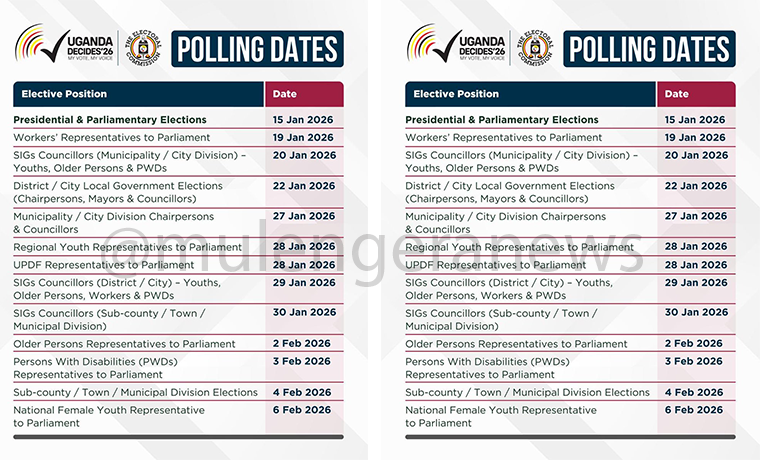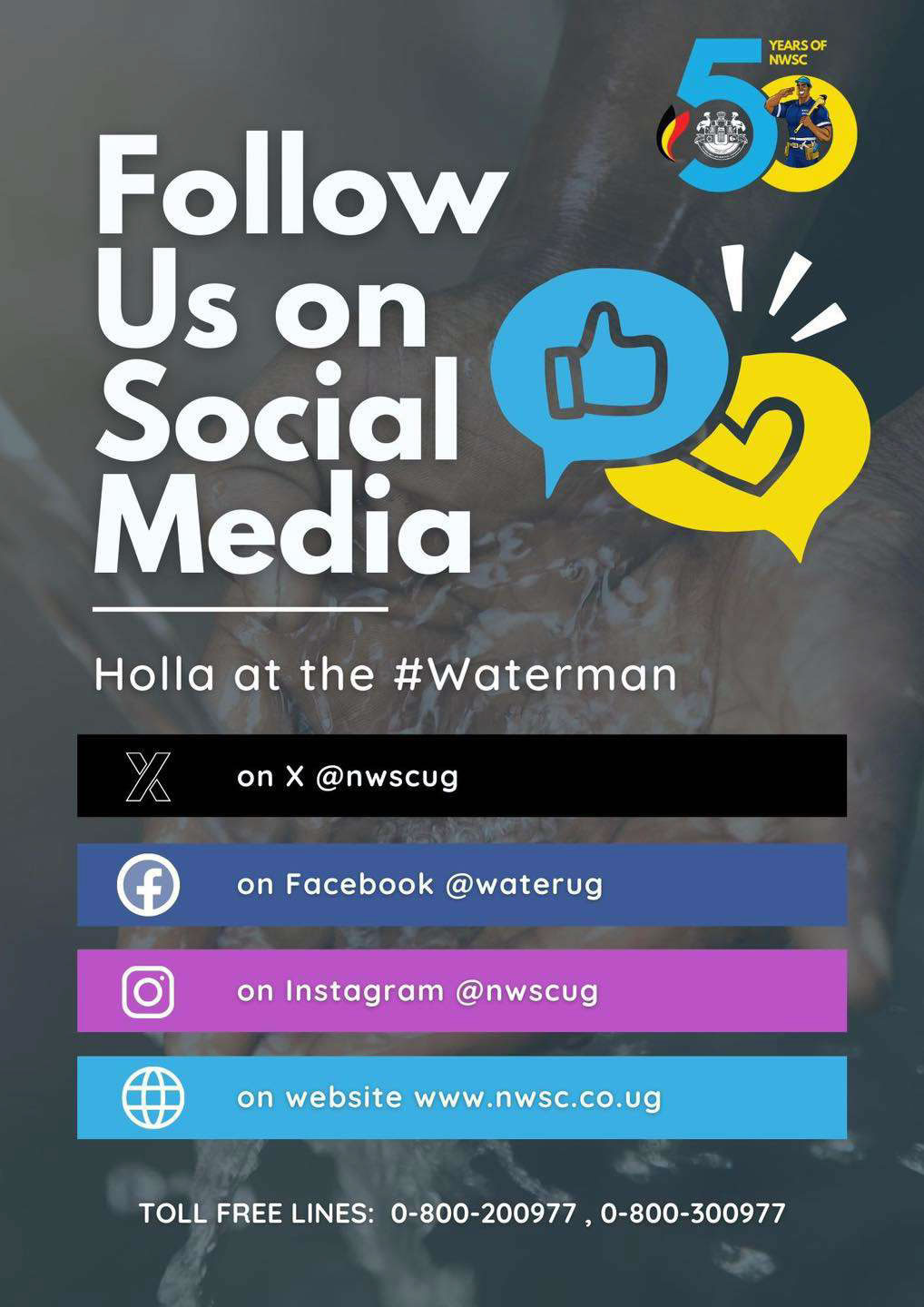By Our Reporters
Last week for three consecutive days, stakeholders (youth & women leaders, the clergy and medical workers) were hosted at Entebbe-based National Medical Stores (NMS) where they learnt many things including the evolution of the entity since inception in 1993. These were three days of very interactive sessions and to his credit, NMS General Manager Moses Kamabare encouraged his guests to speak freely including criticizing his performance where they find it wanting. Celebrated TV personality Maurice Mugisha was at hand to moderate all the sessions including the Wednesday breakfast meeting with clerics led by Archbishop Stanley Ntagali who confessed learning a lot this being his first visit at NMS. Organizers ensured representations covered much of the country on each day.




WHO SAID WHAT?
On their day, the health workers led by Uganda Medical Association (UMA) President Dr. Obuku Ekwaro reflected on their protracted industrial action last year which advocated for increased funding to enable NMS procure adequate medicines and medical supplies for all hospitals. They also commended NMS for doing a good job and most importantly for its open door policy which symbolizes transparency and strong corporate values. They also announced plans to encourage UMA members to compete for elective positions to get to Parliament and influence policy formulation and decision-making. They noted this was the best way to ensure the health sector concerns are adequately appreciated and addressed. On first day Monday, women and youth leaders commended Kamabare for his efforts to reach out to stakeholders and sensitize them about NMS mandate which is procurement, storage and delivery of medicines to designated health facilities across the country. GM told them they were here to be sensitized on what NMS does and to also advise on how the entity can serve them better. They came from various districts of Uganda. Speaking on the group’s behalf, Florence Taaka (Busia Women Council chairperson) and Moroto youth Chairperson Simon Kokoi commended NMS management and wished similar engagements started earlier. The duo said the experiences learnt during the one day engagement with GM and his team would lead to better monitoring of service delivery at health centers in their areas of jurisdiction. As President Museveni recently confessed, the youths are always not very patient with long speeches but the eloquence and witticism with which Kamabare spoke kept them enthusiastic for 105 minutes. That is how long his presentation was but the young people took notes all through and never showed signs of boredom or irritation. The GM is such a great public speaker ever keeping his audience engaged. The stakeholders were hosted as part of activities to mark 25 years of NMS existence since establishment in 1993 under the NMS Act. The peak will be the tomorrow Friday NMS dinner at Imperial Royale.




WHAT HE ACHIEVED;
Many were astonished learning about the reforms, changes and transformation Kamabare (building on his predecessors) has registered at NMS in the last few years of his leadership. For Board members, Kamabare is a frugal pragmatist ever insisting on value for money and prudent decision-making. His frugality manifested in many ways including fleet management. At his insistence, NMS is one of the few government entities were top bosses aren’t entitled to posh government cars. Each, including GM, use their own vehicles. This, gratefully, has saved the entity lots of money that would go on fictitious repairs and things like that. His reforms improved medicines service delivery to the extent that in the recent rationalization of agencies by cabinet, NMS was one of the very few whose disbandment was never recommended. Yet during the three day engagement, stakeholders learnt much more about the Kamabare era transformation to which we now turn.




SAVING GOVT CASH;
Kamabare-led NMS convinced government to centralize procurement of medicines, a move that saved money and increased efficiency. Until 2010, each district local government, hospital and health center was allocated its own cash to procure the required medicines and were expected to use that money to exclusively buy from NMS which was like a large pharmacy owned by government. The entities acted the way they liked and supervision was hard. Many would often get the money and don’t procure medicines the community required or would buy less and pocket the difference (njawulo). NMS would find money (many times bank loans) to stock the medicines anticipating entities to come and buy (using money appropriated to them) the way one walks into a pharmacy to buy. Loan repayment by NMS would occur after entities have paid for the medicine. Loans would be costly (over 22% interest rate) and in the end, 35% of the entire government money appropriated for public hospitals’ medicines would go into interest payment and operational expenses. Only 65% of the budget went into actual medicines procurement. Kamabare consistently argued to the President this was problematic and constrained service delivery. Museveni bought in and in 2010, Cabinet changed policy and cash went directly to NMS (centralization). As a result the mark up for NMS (money lost on none core things like operations) dropped from 35% to 8.5%. Put differently: for every Shs100 GoU released for medicines, only Shs65 went on core medicine procurements and Shs35 into operational costs. Today the figure is Shs8 and Shs92 respectively. The other Kamabare innovation was decentralizing and bringing NMS service delivery nearer to the people through the 9 Regional Customer Care Centers (RCCCs) manned by Customer Care managers and officers. With a RCCC in Mbale, Moroto, Soroti, Gulu, Arua, Hoima, Fort Portal and Mbarara, one can give instant feedback on NMS services without having to travel to Kampala headquarters. Feedback is instantly communicated to headquarters for immediate intervention. Kamabare also ensured stakeholders like the RDCs, MPs, LC5 Chairpersons, Cabinet and the President are adequately kept in the know (using electronic means) each time medicines are delivered. Each of these leaders gets a notification on phone or email whenever a delivery is made. In a place is a delivery cycle according to which each facility is supplied medicines every 60 days (two months). The choice of what is supplied depends on the respective procurement plans tendered by the facilities’ in-charge with DHO’s ratification. There is a delivery note signed by the recipient in-charge whenever supplies are delivered. To ensure timeliness in submitting procurement plans, NMS drew up a delivery schedule which is very strict on deadlines when requisitioning for medicines. In place is a comprehensive IT App with all the relevant information regarding this delivery chain onto which all the leaders are electronically signed. That is why tendencies of MPs or RDCs exhibiting anger towards NMS have totally ceased. They all now know who to blame should any medicines be unavailable when needed. “The President doesn’t have to call NMS anymore if he gets reports of lack of medicines in any facility. He will directly know where the blame lies,” Kamabare explained to stakeholders adding that whenever a requisition and delivery is made, all MPs, RDCs, Ministers etc instantly get a delivery notification on phones and emails. For an emergency like an epidemic breaking out, NMS delivers the required medicines within less than 24 hours. How is this possible? Kamabare introduced shifts and NMS operates 24 hours. The DHO alerts the MoH which uses established channels to call for NMS intervention. Fact is this capability didn’t exist at pre-Kamabare NMS.







DONOR FAVORITE;
Kamabare, whose entry was preceded by open feuding, intrigue and total breakdown of corporate governance practices at NMS leading to donor fatigue, has through his reforms and prudent leadership won back donors resulting into enhanced service delivery. Where GoU budget allocation would clearly have been inadequate, NMS has filled the gap by winning over generous contributions from USAID, Global Fund, UNICEF, GAVI, WHO, the World Bank and Clinton Health Foundation. These have exhibited confidence in NMS leadership by offering additional medical supplies to supplement on the GoU’s inadequate contribution. “Donors don’t just come. They are very thorough and their commitment can only come after thorough checks and audit on one’s practices. Their being part of NMS is proof of high levels of transparency, accountability and strong systems here,” remarked one of the highly knowledgeable and exposed clerics who came with Ntagali for the Wednesday breakfast meeting. Consequently, out of the more than Shs900bn NMS requires/spends annually to provide necessary medicines the GoU gives only Shs250bn (for FY2018/19). The remainder (nearly 75%) is by development partners whose involvement shows confidence in NMS leadership. And yet that isn’t all. The US Ambassador Deborah Malac, renowned for her outspokenness, has previously publicly commended NMS top management urging other GoU entities to emulate their efficiency.




MEDICINE THEFTS;
Prior to Kamabare’s ascendance, in place was a presidential directive to emboss all GoU medicines (with GoU. Not for sale). Preceding NMS CEOs had for their own reasons dragged their feet on implementing this Museveni directive. Kamabare acted swiftly and operationalized the directive. Embossment not only diminished on medicine thefts but also enabled DPP and CID to register more successful convictions for those who risk stealing GoU medicines. In the past health workers connived to steal and took GoU medicines to private pharmacies in Kampala which embossment halted. Offenders would be arrested but DPP wouldn’t pin them because it was hard to prove this was from GoU facilities. Previously only 10% of the theft cases were successfully convicted. Today its 100%. The hard ones are thieves who smuggle it to DRC and South Sudan but not possible anymore in the Ugandan private pharmacies. Floppy medics would blame NMS “for forcing on them medicines they don’t require.” Kamabare ended this through Basic Kit which enabled NMS deal with all health facilities directly as opposed to ending with DHO at district level. Before NMS stopped at district level where lower facilities picked medicines. Basic Kit enabled lower facilities’ in-charges to make their own procurement plans based on local needs. The in-charge signs and puts his phone number on and the form is ratified by DHO putting a stamp. NMS would send medicines which would remain at districts as lower level patients suffered acute scarcities. This ended in 2009 when Kamabare insisted that NMS directly deals with all HCs. The in-charges were given induction training by NMS sharpening their skills to accurately predict the area’s disease burden and accordingly requisition for the right medicines. In delaying to send medicines downwards, district leaders would say there was no fuel and allowances for the drivers or the vehicles had broken down. “This was hurting government popularity because patients know one government. You can’t tell them it’s the DHO or the CAO. To them it’s all one government. We had to sit with DHOs and the in-charges to agree on way forward,” Kamabare says. Today NMS meets the cost to ensure medicines reach every facility as opposed at dropping it at the district DHO’s facility. NMS has since embarked on mobilizing elected local leaders to interact with in-charges more often to make input in the procurement plans for their areas. These days NMS has better working relationship with DHOs and in-charges to the extent that adjustments are permitted in the procurement plan should the disease burden change from what was anticipated prior. In many areas demand for coartem (against malaria) is less than had been requisitioned (because of increased use of mosquito nets) and the in-charges freely order for something else. Ensuring that all elected leaders and RDCs instantly get electronic copies of delivery notes whenever medicine is delivered has taken pressure off NMS.




PALLIATIVE CARE;
Many Ugandans are terminally ill (with things like cancer etc) meaning they live under immense pain (as they wait to die) which NMS controls through the Oral Morphine/Palliation intervention. With its partners, the Kamabare era NMS gives all this free of charge to whoever needs it. This is unprecedented in Africa and globally which is why many come to Uganda for benchmarking. Quoting Chinua Achebe who says tackle the emergency first and blame whoever caused it later, Kamabare justifies the enormous NMS effort that annually goes into retrieving expired medicines. He says there are always such expiries even in homes and if left in circulation, medics will give it to patients and cause more illnesses. Admitting its wrong for medicines to expire in health facilities, Kamabare says at 0.4%, Uganda is doing much better than WHO standards which accept 5% as okay. In fact even the NMS BoD expiry target is 2% but Kamabare has been exceeding it by operating at 0.4% expiry annually. Vaccination rate is another area where NMS has excelled. Until 2014, the MoH (through the UNEPI program) handled procurement and distribution of vaccines and Museveni realized there was a problem. Of kids who required vaccination, only 52% were getting it putting Uganda at par with failed states like DRC, Somalia and South Sudan etc! Museveni directed the mandate to be transferred to NMS whose new head Kamabare he had seen and started liking for being revolutionary in his approaches. Today Uganda’s immunization coverage is 99% and this is something Museveni recently bragged about as he argued with Bazukulu on social media. The rest of the world now benchmarks on Uganda’s record regarding immunization coverage. WHO and GAVI have previously implied Uganda won’t be assessed anymore on this parameter having reached 100% coverage. The two organizations now take NMS staffers to go and popularize the same in other countries. Ugandan hospitals (Mulago inclusive) used to import life-saving supplies like oxygen from Kenya, something Kamabare stopped by pioneering an oxygen plant at MUST before subsequently spreading the same to all regional referral hospitals. Sometime back there was an epidemic and jiggers ravaged villages (causing deaths) in places like Busoga, Kigezi and Karamoja. NMS intervened with a medicine that removes and halts jiggers without using safety pins. Yet that isn’t all. NMS, under its CSR programs, last year offered mass free yellow fever vaccination at Namboole stadium and continues supporting Uganda Police to increase availability of sanitation facilities including decent toilets. Kamabare has also used the GM office to popularize the message of prevention. His argument is 75% of hospital cases Ugandans suffer are preventable once people adjust their living styles. To illustrate his point, Kamabare says Kampala’s demand for coartem is currently down by 95% because of increased preventive use of mosquito nets. He challenged stakeholders (clergy and elected leaders) to intensify sensitization on prevention so that 75% of money spent onto medication is saved and channeled into more productive things like job creation for the young people. He urged them to embrace use of helmets, seat belts, latrines and vaccinating against diarrhea & pneumonia to secure a healthier society.




THE CHALLENGES;
At the NMS meetings, stakeholders concluded the entity would be performing much better if it were not for the constraints beyond Kamabare’s control including in-charges calling off orders whereby one originally orders for say Panadol but later demands for aspirin. Others include creation (or upgrading) of new facilities (could be a district council voting to upgrade it from say HC3 to 4) requiring a higher budget than previously committed. Some medics knowingly prescribe medicines different from what NMS sent just to frustrate patients to go buy in their preferred pharmacies. This creates artificial shortages; distorting the image of NMS and GoU. Poly pharmacy is also a huge challenge whereby medics deliberately prescribe say 6 medicine types for a patient for whom even two medicine combinations would be enough. This act of political sabotage (meant to discredit govt) creates artificial shortages as patients, who come later, find there are no medicines yet it was given to patients that didn’t need it and could clearly do without it. Because NMS or even the President can’t be everywhere, Kamabare urged clerics and LG leaders to become more interested in what goes on at these facilities. See more in photos taken at the NMS meetings. And for comments, call, text or whatsapp us on 0703164755!





























